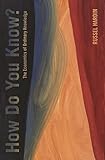How Do You Know? : The Economics of Ordinary Knowledge / Russell Hardin.
Material type: TextPublisher: Princeton, NJ : Princeton University Press, [2014]Copyright date: ©2009Edition: Course BookDescription: 1 online resource (240 p.)Content type:
TextPublisher: Princeton, NJ : Princeton University Press, [2014]Copyright date: ©2009Edition: Course BookDescription: 1 online resource (240 p.)Content type: - 9780691162225
- 9781400830664
- 306.4/2 23
- BD161.H279 2009
- online - DeGruyter
- Issued also in print.
| Item type | Current library | Call number | URL | Status | Notes | Barcode | |
|---|---|---|---|---|---|---|---|
 eBook
eBook
|
Biblioteca "Angelicum" Pont. Univ. S.Tommaso d'Aquino Nuvola online | online - DeGruyter (Browse shelf(Opens below)) | Online access | Not for loan (Accesso limitato) | Accesso per gli utenti autorizzati / Access for authorized users | (dgr)9781400830664 |
Browsing Biblioteca "Angelicum" Pont. Univ. S.Tommaso d'Aquino shelves, Shelving location: Nuvola online Close shelf browser (Hides shelf browser)

|

|

|

|

|

|

|
||
| online - DeGruyter Citizens, Courts, and Confirmations : Positivity Theory and the Judgments of the American People / | online - DeGruyter Why Not Socialism? / | online - DeGruyter Contracting States : Sovereign Transfers in International Relations / | online - DeGruyter How Do You Know? : The Economics of Ordinary Knowledge / | online - DeGruyter Usable Theory : Analytic Tools for Social and Political Research / | online - DeGruyter Secular Cycles / | online - DeGruyter Liberal Loyalty : Freedom, Obligation, and the State / |
Frontmatter -- Contents -- Preface -- Acknowledgments -- Chapter 1. Ordinary Knowledge -- Chapter. 2. Popular Knowledge Of Science -- Chapter 3. Democratic Participation -- Chapter 4. Liberalism -- Chapter 5. Moral Knowledge -- Chapter 6. Institutional Knowledge -- Chapter 7. Religious Belief And Practice -- Chapter 8. Culture -- Chapter 9. Extremism -- References -- Index
restricted access online access with authorization star
http://purl.org/coar/access_right/c_16ec
How do ordinary people come to know or believe what they do? We need an account of this process to help explain why people act as they do. You might think I am acting irrationally--against my interest or my purpose--until you realize that what you know and what I know differ significantly. My actions, given my knowledge, might make eminently good sense. Of course, this pushes our problem back one stage to assess why someone knows or believes what they do. That is the focus of this book. Russell Hardin supposes that people are not usually going to act knowingly against their interests or other purposes. To try to understand how they have come to their knowledge or beliefs is therefore to be charitable in assessing their rationality. Hardin insists on such a charitable stance in the effort to understand others and their sometimes objectively perverse actions. Hardin presents an essentially economic account of what an individual can come to know and then applies this account to many areas of ordinary life: political participation, religious beliefs, popular knowledge of science, liberalism, culture, extremism, moral beliefs, and institutional knowledge. All of these can be enlightened by the supposition that people are attempting reasonable actions under the severe constraints of acquiring better knowledge when they face demands that far outstretch their possibilities.
Issued also in print.
Mode of access: Internet via World Wide Web.
In English.
Description based on online resource; title from PDF title page (publisher's Web site, viewed 29. Jul 2021)


